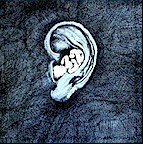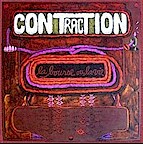 Robichaud was a member of the Ville Emard Blues Band, a Montreal ensemble that was instrumental in many Quebec radio and TV broadcasts, as well as recordings at the time. There she met bassist Yves Laferriere, and after striking up a musical raport, decided to form a group of their own. During some early rehearsals, they took on guitarist Michel Robidoux, and drummer Christian St Roch, then Rawn Bankley as the second guitarist and Robert Lachapelle on keyboards. Like Robichaud, everyone had ties to VEBB. They continued developing a style based on the various eclectic sounds around them, and after a few months on the Montreal circuit, they were signed by Columbia Records. With Dervieux lending a production hand, were in and out of the recording studio by Christmas ’71. During recording, Robert Stanley came in on guitars, and Denis Farmer and Marcel Huot both did drum tracks, hung around, and eventually both became full-fledge members. All three were fellow VEBB alumni. Their self-titled debut was released the following spring, quickly becoming one of the hottest selling francophone albums in the province. The label sent them back to the studios to record slightly altered arrangements with English vocals, gave the songs English titles, and released that version of the album with the same jacket by summer ’72. Largely keyboards/piano-based light bluesy rock, it drew equal inspiration from local folk music and British and American progressive rock. It produced one single from the French version, “Ste-Melanie Blues” b/w the instrumental “Pixieland,” and also contained the lead-off “Chant Patriotique” (“We Made It”), “Delire” (“Star Child”), and “Fin du Commencement” (End of the Beginning”). It became a hit on Quebec’s airwaves, with several tracks getting decent FM play. For the next couple of years, they made some live appearances throughout Quebec and the Ottawa Valley, and found themselves some gigs at outdoor festivals. Robidoux and Bankley had both left to pursue solo careers, and St Roch was replaced behind the drums by Richard Perotte. By this time, Joey Armando and Jimmy Tanaka were added on percussion, and Carlyle Miller on sax and flute became part of the group. Capitol had dropped them by this point, and the band found a new home at Deram, a small Montreal-based independent label. They released LA BOURSE A LA VIE in the summer of ’74, dedicated to the recently passed away Franck Dervieux. A French-only album, it followed in the same vein as its predecessors, combining strong vocal harmonies with symphonic elements in the three-part title track, the instrumental “Jos Coeur,” and funky grooves in “Claire Fontaine” and “L’Alarme À l’Oeil.” After the album did nothing on the charts and instilled no confidence in the cash-strapped label’s execs, the band was dropped, but carried on until 1976, with Laferriere and Robichaud as the base. Several tracks written and recorded for a third album, eventually appeared on Laferrièrre’s solo album LA CUISINE ROUGE in 1978. Both French Contraction albums were released individually in the late ’90s on the ProgQuebec label, and also resurrected a 1974 Montreal radio station studio performance, releasing it as LIVE 1974 in 2009. Along with select cuts from the two albums, it also featured two different versions of “Sagesse,” previously unreleased.
|





